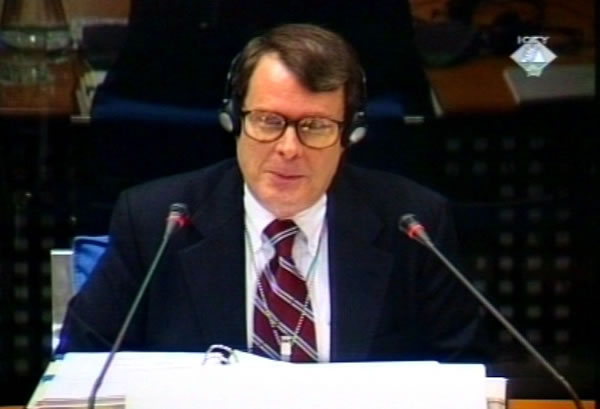Home
THE PAPER TRAIL
The prosecution has a number of official Republika Srpska documents, mostly confidential in nature, clearly indicating the designs and plans of the Bosnian Serb political and military leadership
 Patrick Treaner, witness at the Momcilo Krajisnik trial
Patrick Treaner, witness at the Momcilo Krajisnik trial "If we have decided that this is the Republika Srpska, it is Serbian then, and therefore the citizenship is also Serbian. There are no other nationalities, just religions. "
Thus Momcilo Krajisnik put an abrupt end to the debate in the Assembly about the Citizenship Bill in November 1992, when some of the deputies expressed their concern about the draft which would allow "a person born in the territory of the RS to have a right to its citizenship". According to the interpretation put forward by the then minister of physical planning, Milojevic, this could mean "that all Muslims and Croats, who have been expelled, are entitled to the RS citizenship. ".
In mid-nineties, when the Tribunal in The Hague was starting its work, its first chief prosecutor Richard Goldstone frequently stated that those who had planned and ordered the crimes in the former Yugoslavia – unlike the Nazi leaders tried in Nuremberg – did not leave behind tem a "paper trail", written documents disclosing their intentions and plans. He was wrong. In the meantime, the Office of the Prosecutor at the Tribunal came into possession of a number of documents, mostly confidential in nature, which clearly indicate the intentions and plans of the Bosnian Serb political and military leadership.
On the basis of these documents, the prosecution expert Patrick Treanor made a "Report on the SDS Leadership 1990-1992". It was presented at the trial of Momcilo Krajisnik. The minutes from the closed sessions of the Bosnian Serb Assembly, the Presidency and the RS Government are of special importance, according to Treanor.
For instance, during an RS Government session held on 17 October 1992, the minister of justice and administration, Momcilo Mandic, submitted a report about the "situation in camps and collection centres". The conclusion was that the "existing centres and camps are illegal and should be dissolved as soon as possible." In late November 1992, the RS Presidency considered a request by the head of the Serbian Orthodox Church, Pavle, to release the detainee Elvir Kesedzic from the Manjaca camp.
According to the prosecution expert, these two documents indicate that the government was in charge of the camps issues, whereas the RS Presidency had the power to grant pardons to prisoners. The accused Krajisnik was a member of the Presidency.
The role of Momcilo Krajisnik as the Speaker of the Assembly, according to Treanor's testimony, did not include merely opening and closing the sessions. The accused directed the course of the debate, very often took part in them or made comments on certain interventions, making sure that in the end the deputies voted "as they were expected to", as had been agreed beforehand at a meeting of the core SDS leadership.
At the end of his seven-day testimony, Treanor quoted several minutes of Assembly sessions held after the period covered by the indictment against Krajisnik (mid-1991 – end of 1992). At the session held on 8 January 1993, the debate on the peace talks in Geneva focused on the "fact that it is impossible for the different communities to live together". Deputy Radic from Ilijas, as the minutes show, said, "I do not know under which conditions we would be able to live together now. They have done us so much evil, and we have done just as much evil to them."
Krajisnik sums up the discussion, stressing that it should be explained to the international community that "we are not the same as them", that Muslims as a nation were a "creature of Communism", and that "we do not accept this artificial nation, since they are a sect, a group or a party of Turkish origin. ". Stressing that they were "infidels, a nation which is not a nation, which would like to be a nation, but without any arguments for that ", Krajisnik called upon the deputies to "take a vote on this issue ", and then stated the result of the vote in this manner: "We have accepted unanimously that Muslims are a nation made up by our former masters."
At the session held on 28 August 1993, Krajisnik summed up the interventions of the deputies who had all insisted on the ethnically pure territory as follows, according to the minutes: "It will be the greatest tragedy if Muslims accept to live with us. In that case we would lose our State. This we cannot allow. "
Krajisnik does not stand accused for what he said at public or secret sessions of the Assembly or RS Presidency, but for what the forces subordinate to him did "in the field" in order to implement the SDS vision of a Serbian state in the ethnically pure territory, without any "artificial nations", "infidels" and" sects."
Linked Reports
- Case : Krajisnik - "Bosnia and Herzegovina"
- 2004-02-26 "A WELL-COORDINATED DUET" – KARADZIC AND KRAJISNIK
- 2004-02-23 BOSNIA AS A "CONNECTION"
- 2004-02-19 “WHOSE IS BOSNIA?”
- 2004-03-03 OF PISTOLS AND MAPS
- 2004-04-13 KRAJISNIK COMPLAINS AND CRITICISES
- 2004-04-16 DID IZETBEGOVIC ADVOCATE THE STRATEGIC GOALS OF THE SERBIAN PEOPLE?
